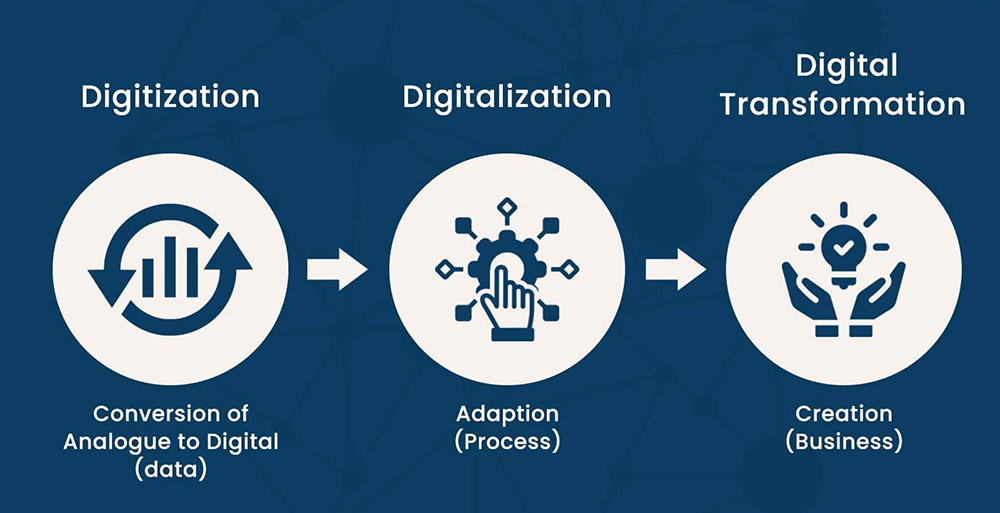What are Digital Transformation, Digitalization, and Digitization?
In today's fast-paced world, technology has become more personal in nearly every aspect of our lives. In fact, most of us cannot recall a time when we did not use a gadget or technology to speed things up or improve processes.
Technology has completely changed the way we engage with each other and the world. The advancements in technology have led to the emergence of several new terms that have become buzzwords in the commercial world, including digital transformation, digitalization, and digitization.
Although these terms are generally used interchangeably, they have distinct and unique meanings. Let’s look at each of these terms and understand their differences.
Digital Transformation
Digital transformation can be referred to as the process of integrating digital technology into all areas of a business or association, performing in an abecedarian change in how it operates and delivers value to its guests.
It involves the relinquishment of digital technologies and platforms to enhance the client experience, optimize internal processes, and increase functional effectiveness.
Digital transformation is feeding technology and changing the organizational culture to embrace a digital mindset.
Digital transformation can take different forms depending on the assiduity and the association. For illustration, in retail strategy, digital transformation may involve the integration of mobile apps and e-commerce platforms to enhance the client experience.
In discrepancy, the manufacturing assiduity may involve espousing robotization and robotics to optimize production processes.

Digitalization
Digitalization is a way of converting analogue information into digital form. It involves the usage of digital technologies in an advanced manner.
That is to produce, store, and process information in a digital format. Digitalization enables associations to streamline their operations, reduce costs, and increase effectiveness by incorporating Cloud and multi cloud solutions.
Organizations can fluently access, store, and share data across different platforms and locales by digitizing information.
Digitalization has become an integral part of modern business operations. It involves the use of technologies similar to document operation systems, pall computing, and electronic records operation systems to digitize information.
This enables associations to reduce paper-grounded processes, exclude homemade data entry, and ameliorate delicacy and effectiveness.
Digitization
Digitization is the conversion of physical information into a digital format. It includes the usage of technologies such as scanners, digital cameras, and optical character recognition (OCR) software to capture and convert information into a digital format.
It may also involve the use of digital editing tools to improve digital content quality.
Digitization is particularly important for associations that have a large amount of physical or analogue data, similar to libraries and art galleries.
By digitizing their collections, these associations can save and share their content with a broader audience while also making it easier to manage and access.

Differences between Digital Transformation, Digitalization, and Digitization
Although digital transformation, digitalization, and digitization are related, they have different meanings and connotations. The main differences between these terms are as follows, they can be primarily split into two sub- areas.
a. Focus
Digital Transformation focuses on espousing digital technologies to transform how an association operates and delivers value to its guests.
Digitalisation is the main focus on converting analogue information into a digital format, while digitization focuses on converting physical or analogue data into a digital format.
b. Impact
Digital transformation significantly impacts an association, performing an abecedarian change in how it operates and delivers value to its guests. Digitalization and digitization, while important, have a more limited impact on the overall association.
Final Takeaways
The concept of Digital Transformation has gained traction as companies seek flexible ways to ensure business durability.
To achieve this hybrid workplace model, businesses are espousing a Digital Transformation result that combines remote work with in-person work arrangements, typically referred to as a "hybrid workplace solution."
As a result, numerous companies are integrating process automation solutions, process structure services, and digital workflow solutions to facilitate remote work. These processes not only help with automation but also improve quality.
Digital transformation, digitalization, and digitization are important terms that have become less applicable in the current business terrain. It involves espousing digital technologies to transform how an association functions and delivers value to its guests.
The COVID-19 epidemic has stressed the need for digital metamorphosis, digitalization, and digitization. The epidemic has forced businesses to borrow new technologies and ways of working to stay alive.
Given the need to evolve constantly, it is important for businesses to stay abreast of all of the technological advancements. The right use of digitalization, digitization and digital transformation can expand growth horizons for companies and ensure success in the long run.
News & Events
Keep up to date
- 18Dec
Ricoh recognised as a Top 5 global AV Integrator in SCN Top 50 Systems Integrators 2025
- 11Dec
Ricoh Recognised as a Sustainability Leader in Quocirca's 2025 Report
- 31Oct
Ricoh perovskite solar cells installed on Japan Aerospace Exploration Agency cargo transfer spacecraft1 HTV-X1
- 17Oct
Ricoh recognised among Forbes’ World’s Best Employers 2025
